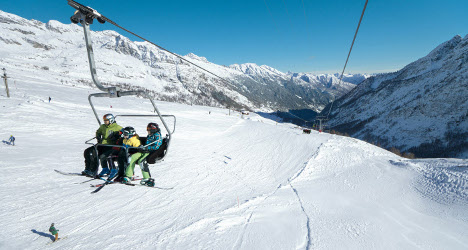German smartphone app ‘Schnee und Mehr – Der Atlas’ compared the prices for skiing across the Alps this coming season and found that the ten most expensive ski resorts in the Alps are all in Switzerland, news agencies reported on Wednesday.
Zermatt tops the list, with a six-day peak season adult ski pass for the whole Zermatt-Aosta region (part of which is in Italy) costing a whopping 463 francs.
Similar passes for Zermatt-Cervinia and Zermatt alone came second and third in the list, costing 434 francs and 380 francs respectively, as confirmed on Zermatt’s website.
Engadine-St Moritz and Verbier-Four-Valleys completed the top five, while all ten Swiss resorts analyzed cost more than 300 francs for a six-day pass.
The cheapest Swiss ski pass among the resorts examined was the ‘Superpass’, at 333 francs for a six day adult pass, which covers the three ski regions of Gstaad, Adelboden-Lenk and the Vaud Alps.
Within the euro zone, France was found to be the most expensive country for skiing, with a six-day adult pass averaging 271,70 euros (295,50 francs).
Most resorts in Austria were slightly cheaper, advertising prices between 280 and 290 francs, apart from the country’s most expensive, Ischgl-Silvretta, at 281.50 euros (305 francs) for a six-day pass in peak season.
German resorts cost around 240-250 francs for an equivalent pass, found the research.
But there is some good news for Swiss skiers.
More than 70 percent of Switzerland’s resorts have retained their prices from last year or even reduced them, according to Seilbahnen Schweiz, the umbrella organization for lift operators.
As a result, prices have only risen by an average of 0.6 percent this season, according to its September survey of 50 ski resorts in the country.
Swiss Tourism also defended Switzerland’s prices.
Speaking to news agencies, spokesman André Aschwanden said international studies show that Swiss winter sports destinations “distinguish themselves in comparison to other European resorts in several categories, for example the safety of slopes, the scenery, the authenticity of the resorts and their family-friendly conditions”.



 Please whitelist us to continue reading.
Please whitelist us to continue reading.
Member comments